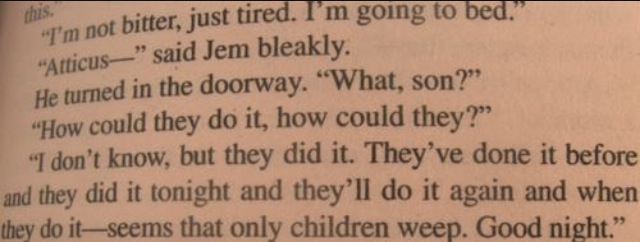This week’s Flashback Friday: To Kill A Mockingbird by the recently late Harper Lee.
EDIT: This post was originally made on November 28, 2014. I made it before the release of Amaskan’s Blood and without the knowledge that racism and police brutality would continue to worsen. Today is February 19, 2016. I’m currently packing the belongings in temp housing to move tomorrow into our new home. And as I pack, I remember being twelve and reading To Kill a Mockingbird for the first time.
The lesson that something different doesn’t have to be feared or hated sings in me as I embrace change. Growing up, we moved more often than most and it’s a reality that didn’t change upon adulthood. When buying our house, we were asked to explain why we had moved every two years for the last decade and while each move had its reasons, my insides tremble at the idea of leaving this new home sometime in the future. I can’t imagine what a life would be like without such freedom.
There are deeper lessons in the book, lessons I address in the original post. I know that freedom comes at a cost and many people of color, LGBT, etc. pay those costs as they fight for the freedoms I have. Hard work bought this new home, but so did privilege.
Harper Lee has died, taking an amazing voice from the world, and I’m saddened by the loss. It reminds me that I, too, am getting older. Change is a part of getting older. It’s a part of my life and future. I am thankful for the opportunities that changes brings.
RIP Ms. Lee.
It’s a holiday week, so I’m breaking the rules a bit. Instead of a Flashback Friday on a work of SF/F, I’m going to do one on my favorite non-SF/F novel: To Kill A Mockingbird.

Still relevant today.
I read a post on Wednesday where the writer talked about how fighting for what is right and just in the world, doesn’t always make one popular. In fact, you’ll usually lose friends in the process. That same idea is one of the things that drove the character, Adelei, in my novel, Amaskan’s Blood. It didn’t matter if she lost everything as long as she was doing what was right.
Some days I feel the same way. I worry about being myself, knowing that in doing so, I could lose readers, which in turn, loses me money and part of my livelihood, but if there is nothing else To Kill a Mockingbird taught me, it is to unapologetically be me. Always. For a writer’s self will always bleed into their work.
To Kill A Mockingbird has always been a special book for me. When I first read it for school, it opened my eyes to a world I’d seen but not understood–one where people hated others simply because they were different. I’d seen the face of prejudice in my family members and sometimes friends–even myself at a very early age–but I didn’t understand how people succumbed to such hatred and stupidity as to judge others.
The irony of the passage in the picture and the fact that it still rings true some 54 years later is frightening. I’m not going to delve into too much of the politics around Ferguson, but I will say this–racism is alive and well in the United States. It’s difficult to see when one lives a privileged life, but it’s here.
Harper Lee spoke of such things in 1960 because it was alive and well then. Freedom rides, lynchings, and protesters in the streets. Civil disobedience and hate crimes. Burning crosses and dead children in churches. Police turning fire hoses and dogs on children.
Sad that it doesn’t wear much of a different face these days. And just like the child who read To Kill a Mockingbird and learned to stand up against prejudice, my adult self will continue to write characters who do the same.

